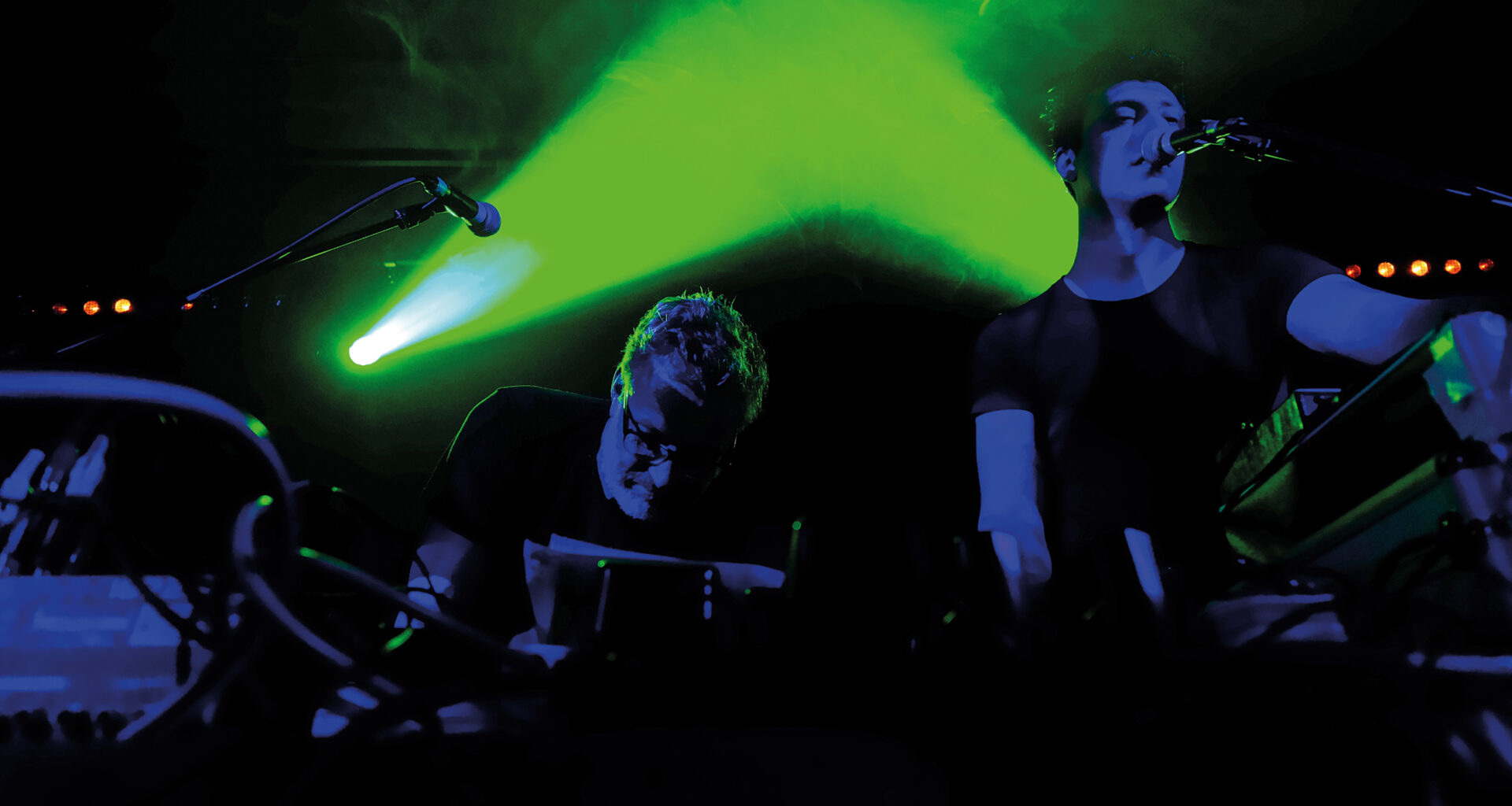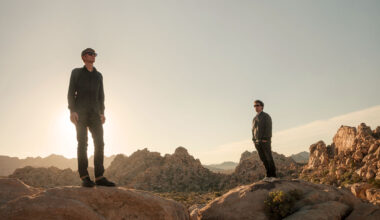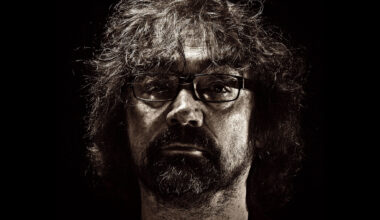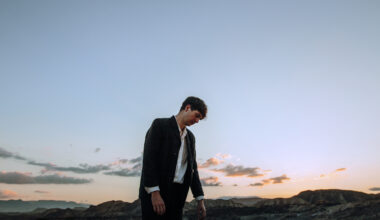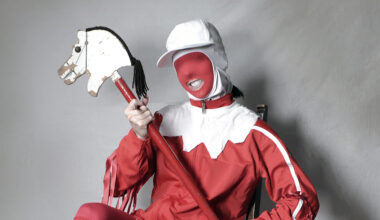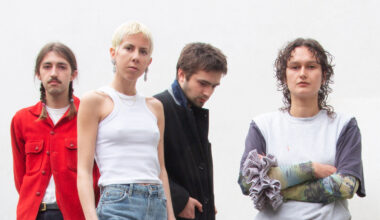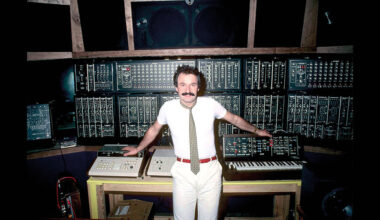In a further bid for musical world domination, Blancmange’s Neil Arthur enlists musician, sculptor and film-maker Jez Bernholz to create the sumptuously minimal Near Future. the pair’s superb debut album is ‘ideal home’.What’s it all about? We ask the questions….
Neil, your work seems to get increasingly minimal with each release…
Neil Arthur: “There’s no point adding another layer in the hope it’ll make what’s there already any better if what’s there initially isn’t any good in the first place. I’m finding, generally, less is best and often sonically and lyrically it’s more direct. The view becomes clearer.”
Do you share Neil’s love of the minimal approach, Jez?
Jez Bernholz: “I really do. The more music I produce, the less clutter I want. My own music has definitely taken this direction over the last few years and it’s actually very freeing. It becomes more meaningful the less I try to throw at it.”
Where does this approach come from?
Jez: “For me, I’m inspired by a lot of music by artists that aren’t primarily musicians in a traditional sense – sound pieces that convey existential dread.”
Neil: “I try to go with my instinct, trust my own judgement, which is something I’ve found difficult in the past. To share the creative process is a fantastic way to learn. I trust Jez, he trusts me, in which case shouldn’t we be finding that self-trust within ourselves? This sounds like therapy, eh?”
Any minimal electronica influences you’d care to mention?
Jez: “Although not strictly electronica, hearing Alvin Lucier’s ‘I Am Sitting In A Room’ for the first time was a pivotal moment for me. Daphne Oram, Delia Derbyshire. Emptyset, Kara-Lis Coverdale, Oneohtrix Point Never, his ‘Replica’ era, Manuel Göttsching, Laurie Spiegel, Monoton, EVOL…”
Neil: “There’s always parts of things, not necessarily music, and even then not always electronic or especially minimal. Jon Hassell, Nicolas Jaar, ‘The Return Of The Durutti Column’, Oneohtrix Point Never, Terry Riley, This Heat, Shock Corridor, Seeland, Neu!…”
When did you first hear each other’s work?
Neil: “My manager sent me Jez’s ‘How Things Are Made’ album, which I liked and still like very much. I invited Jez to play at a couple of London shows that Blancmange were doing. We got chatting, kept in contact, and then started working on a couple of pieces, ‘Ideal Home’, which is the title track of the album, and ‘Overwhelmed’ to start with, exchanging files electronically.”
Jez: “I am sure I knew of Blancmange’s music already, but my first real conscious awakening was the reissue of the ‘Irene & Mavis’ EP by Minimal Wave. That really got my attention.”
Neil does like to collaborate from a distance, but you have met in real life, right?
Neil: “No. Oh no… That’s a yes.”
Jez: “Certainly have. All the time, can’t stop meeting! Consistently touring together for the last two years helps! We’ve played two shows together as Near Future as well, with more shows to come we hope.”
How do collaborations happen? Is it like dating at school, you know, “my friend fancies you”!
Neil: “Yes, it’s exactly like that.”
Jez: “In the case of Near Future, it came through a mutual respect for each other and then a friendship that developed over time after Blancmange’s manager put us in touch. We clicked after a Blancmange gig where I was the support and a tour followed where it was suggested we try making something together, to promote the shows. It became unstoppable, an album’s worth of songs just flowed pretty effortlessly.”
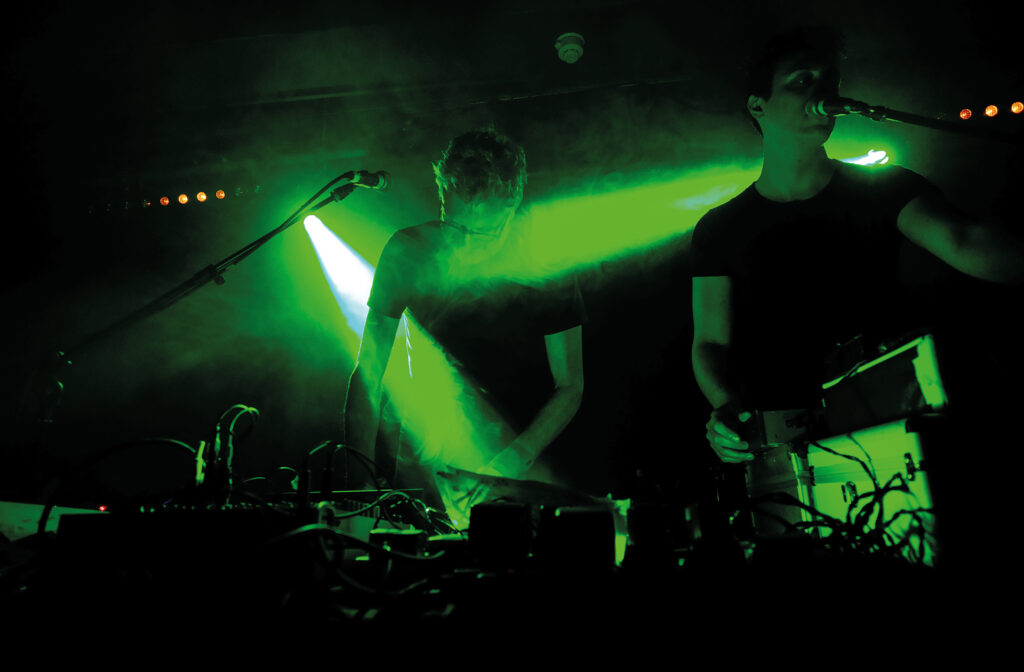
What difference to the process does it make if you have or haven’t met someone?
Jez: “Even though we had met, our writing only happened remotely. Initially, we didn’t know each other that well either, so there was an expectation, but not too demanding. It was unusual for me, really exciting, like getting a parcel from someone, but not knowing what’s inside. It was quite a tactile experience even though it was only emailing.”
Neil: “I’m not sure. I’d quite like to work with someone I haven’t and will never meet. Although we had met, so could put a face to the emails we exchanged. The relationship developed principally through the language of music and the files we sent one another.”
Where does the desire to work with other people come from?
Neil: “It’s about sharing the load. You get twice as much done. And as I mentioned earlier, you can learn so much. It’s such a relief to work alongside someone like Jez, who can knock down or scale the brick walls that I find impenetrable.”
Jez: “It’s a new challenge and you constantly hold yourself to somebody else’s standards. I project ‘What would Neil think of this?’ onto the music, or even ‘How would he be surprised?’. It’s fun, a little game, and I also think it makes you operate outside of your comfort zone. You have to adapt and move quickly and it makes it all so much more freeing than just working on your own, where it feels like there’s never an end point.”
How does Near Future work? Is there a plan? A central premise?
Jez: “I think we just plan to keep going, the premise is to not have a premise. Although that said, we have already discussed how we might put together another album after ‘Ideal Home’… but that’s bound to change.”
How would you describe the project?
Neil: “From the inside, it’s like your favourite book or film or album or pint not ending. It’s being in a sweet spot in a room of sound. It’s when a string of passes leads to a goal, with each player not asking for the ball, because they simply want it, but more because they know what they are going to do with it even before they receive the ball. It just seemed to flow… that’s a very Cantona answer.”
Jez: “I’d say it was loose, modest, minimal, abstract, pensive and aesthetic.”
With so much music about, is it difficult these days to justify making more? Do you need a reason?
Neil: “I’ve never contemplated the need to justify making music, but that’s now got me thinking. I’ve made plenty of mistakes along the road, many in public, but if you continue to learn from them, then it becomes an experience, not a mistake. It’s only music, art, noise, poems, but I need to do it. I can’t imagine a time when music will cease to be relevant.”
Jez: “I’d worry about that more if I had the time to. I just get on and do it with the small amount of time I’ve got. I just need to do it.”
Who brings what to the Near Future party?
Neil: “In a way, we are still finding that out. There’s always a surprise and Jez has continually done that throughout the making of this album. I like a surprise. I like to supply the Tupperware, which is crucial for those leftovers.”
Jez: “Neil definitely gives it the urgency, the poetry and the charm. His approach is level-headed and very inspired too.”
There’s a whole raft of “found sounds” at work on ‘Ideal Home’. That’s a deliberate move, right?
Jez: “It was initially coincidence when we first exchanged ideas, there were two different pieces both featuring found sounds. It developed from there, it was a common ground that lifted the project out of being typical songs and gave the music a sort of narrative arc that wasn’t prescribed, but helped everything come together. I don’t think either of us were prepared for it.”
Neil: “As Jez mixed the album, there was a discussion about using field recordings to link songs. All the sounds came from our domestic surroundings, both indoors and out.”
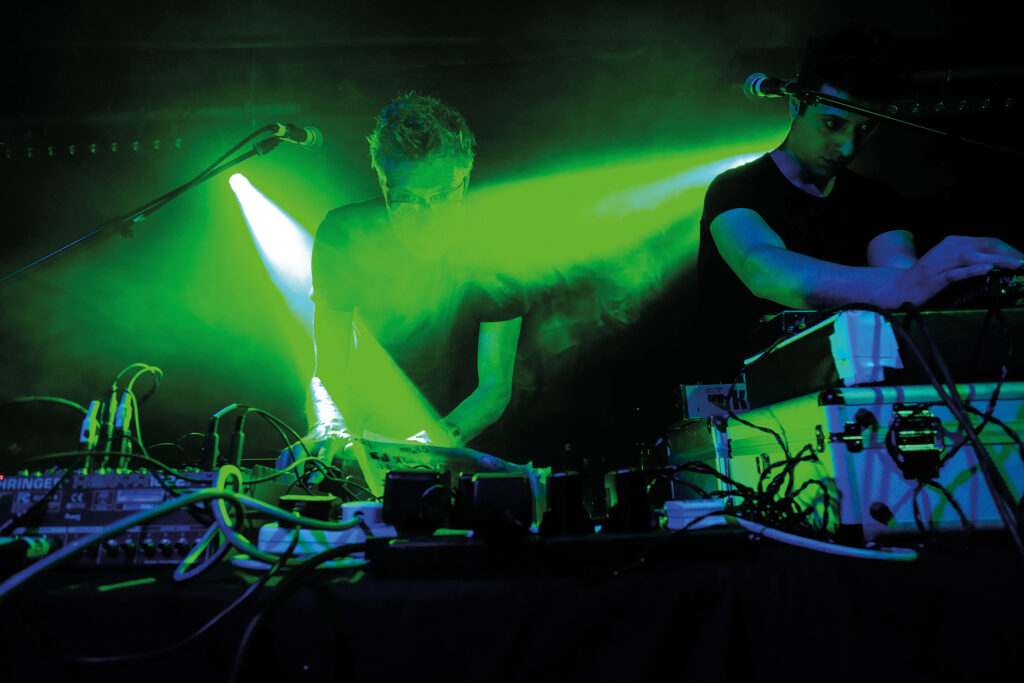
Is that a café on ‘Field This’?
Neil: “No, it’s in me in my kitchen, putting crockery away! While we were writing, ambient sound from our immediate environment presented itself as relevant as any sound from a synth.”
Jez: “They are very personal, micro-details. I also think they’re details in the same way a synth or drum might be, just material that reflects a particular moment or feeling. Using them makes the album quite gestural, implying what happens in private, which adds to the intimacy of the record. Using those sounds binds the vague subtext of the album together.”
There are some great song titles here. ‘Gap In The Curtain’, ‘Fish And Chips’ and especially ‘Kites Over Waitrose’. Irene and Mavis would be proud?
Neil: “Ha Ha. Thank you! And many of those early songs were instrumental, eh? ‘The Problem Started When My Mother Pulled Up The Radishes’! There’s a shared domestic sensibility. Actually, seeing a photograph of Jez ironing made me think of Irene and Mavis.”
I know better than to ask Neil about his lyrics, but ‘Ideal Home’ feels like it’s one long narrative, rather than a collection of “songs”. Is this how you see it?
Neil: “Long before the album was finished, we performed at Sensoria in Sheffield and we did perform it as one piece – it seemed a natural thing to do as it sort of flows as one.”
Jez: “I spent a long time mixing the album, and the more time I spent with it, the more it dawned on me how interlinked the subjects and music in each song were – the titles, the artwork, everything made sense. It just fell into place and it was such a magical feeling to realise that. For me, that’s the best standard by which to measure that a piece of art you’ve made is really good.”
‘Dawn’ is a stunner. There’s a lot going on in there, care to talk us through it?
Jez: “Thanks! It started after Neil had a sleepless night, I believe. He recorded a dawn chorus while he attempted to do a bit of writing, listened back to it, and heard a mechanical throbbing rhythm, then added synths and lots of feedback sounds that echoed that. I loved the brooding atmosphere of what he sent me. I’d never done anything spoken word before, I was never sure of myself doing it, but I’d had some unused words knocking around, and just instinctively went with it. The words made more sense to me when I heard the birdsong and the title ‘Dawn’ that Neil had given it. The lyrics are about awakening from a dreamlike state, literally and metaphorically, in part responding to the birth of my son by facing an existential crisis and a hazy nostalgia, and it all fitted into place nicely.”
There’s a film soundtrack feel to the album, like Peter Gabriel somehow. Discuss…
Jez: “I love the ‘Birdy’ soundtrack and ‘Passion’ is one of my favourites too. They definitely had an influence on me musically. I don’t know if I ever felt this record was a soundtrack, but it does have cinematic moments. There are similar themes running through each song and they are all very personal for both Neil and myself. It’s amazing how it all clicked together so beautifully.”
There’s something very alive about minimal electronic music. What is it about keeping things simple that resonates so much?
Neil: “There’s more room to think, either side of the wall, giving or receiving.”
Jez: “Sometimes people just like to be told something directly.”
Machines shouldn’t evoke such warmth and yet here we all are…
Neil: “Crazy old world. Perhaps this album is a reflection of a certain melancholic disposition.”
‘Ideal Home’ is released by Blanc Check
